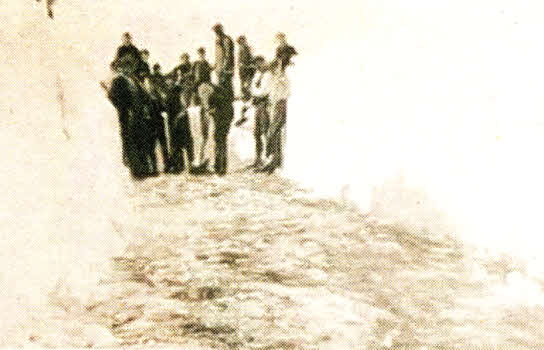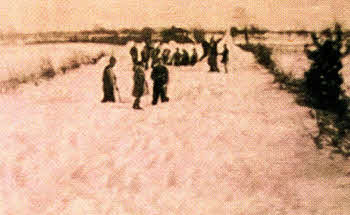
'Snow' place like home as winter grips Lisburn
BY THE DIGGER
 |
 |
|
These old photographs kindly provided by Caroline Price, show a group of people, believed to be in the Glenavy area, clearing snow when falls were measured in feet. |
|
AUTUMN has passed and we are now firmly in winter's grip. There's no rose without a thorn. The sound of tapping the glass on the barometer is a sound mostly confined to the past now. The changing of the hand indicated a change in the weather.
"The north wind doth blow, and we shall have snow" may also be an indicator surpassed by modern technology.
Most cars now have a digital readout providing us with up to the minute temperature readings with a frost warning indicator in case we have failed to noticed the glistening on the road's surface.
A light dusting of snow can have an immediate effect on our normal daily routine, affecting our transport systems and schools. There are still many people in the district who can recall a time when snowfalls were measured in feet and not inches. There is an inscription on a headstone in the graveyard at Dundrod Presbyterian church which is a stark reminder of a previous winter. An unfortunate member of that congregation lost his life when he, as the inscription states, "perished in a snow storm" on the 18th January, 1941. That tragic event occurred in the area close to Divis mountain. I heard another story from that area of a man who set out on foot in heavy snow drifts and when he returned he related the story that he had been able to look down the chimney tops of neighbouring homesteads as he passed by!
It was imperative that people living and farming the rural areas of the district attempted to carry on as normal in such circumstances in the past.
One of my acquaintances informed me that there had been a bad snow in
1937. It was six feet deep in places. In order to get the buttermilk to the
local village railway station for transport to the Belfast bakeries, it was
necessary to use a horse and slipe. The snow lay about the ditches for
almost two months. "Loanins" were dugout by hand to allow access to the
farmsteads. I had heard of the story of a group of men arriving on a Sunday
morning to assist with the digging. The snow was removed from the lane and
piled to either side. Their work would all be in vain. Thanks to the
overnight wind they awoke next morning to find that the snow had been blown
onto the lane. One local wit informed the members of the working party that
was their punishment for working on a Sunday!
There were those who were not always willing volunteers when it came to
labour intensive work. One young chap who had been asked by his mother to go
out and assist with the removal of the snow from the farm lane retorted "The
Lord put it there, and no doubt he will take it away!" This was an era when
local school children could find themselves before the local magistrate
after a bout of snowballing.
In 1947 a local milk collector called Herbert Boyd was undeterred by the heavy snow fall and he was determined to carry out his rounds. Local Glenavy balladeer William Scott J.P. penned a few lines dedicated to Mr. Boyd and I believe that the local community made a presentation to him.
"In the year of '47
The North East wind doth blow
O'er woodland plain and valley
And it filled the roads with snow.
You had no end of trouble
For the drifts were mountains high
But ye drove the lorry forward
And to help us you did try.
When we didn't think it possible
To see your face one day
You bravely battled onwards
And took our milk away.
We do appreciate your efforts
And we'd like for you to know
That on giving you this present
The gratitude we owe.
We hope you'll long be spared
And good health you'll always feel
And that for many future years
You'll sit behind the wheel.
And we hope you and your lorry
From all trouble will be free
And we trust for half a century
Your face each morn we'll see."
On my travels through the district I was shown a diary kept by a farmer and dated 1963. Many will recall that was another year of the "big snow."
An entry dated 14th January of that year stated that the roads were "snowy and frosty." One week later the farmer managed to get the milk to "the end of the Progue." The "Progue" or "Prog" was located in the townland of Ballypitmave, situated between Lisburn and Glenavy. This road is now the Cairn Hill Road.
The entry in the diary on the 5th of February states "blowing snow, all roads blocked." Over the next two days the frustration of the farmer were clearly indicated. "Every place blocked, got no milk away." On the 8th, the road had been opened by locals and three days milk was taken to the collection point. The diary informs us that one week later the conditions were still "slushy and rainy...plenty of snow."
I must admit at my time of life, snow is much easier on the eye from the comfort of a warm armchair in a centrally heated home. Compared to days gone by our winters are most definitely milder. Just last week a lady remarked to me "It's absolutely freezing in here isn't it?" How right she was - we were actually watching an ice hockey match at the Odyssey in Belfast!!
The Digger can be contacted via The Ulster Star office or by email diggerarticle@hotmail.com.
03/11/2010
